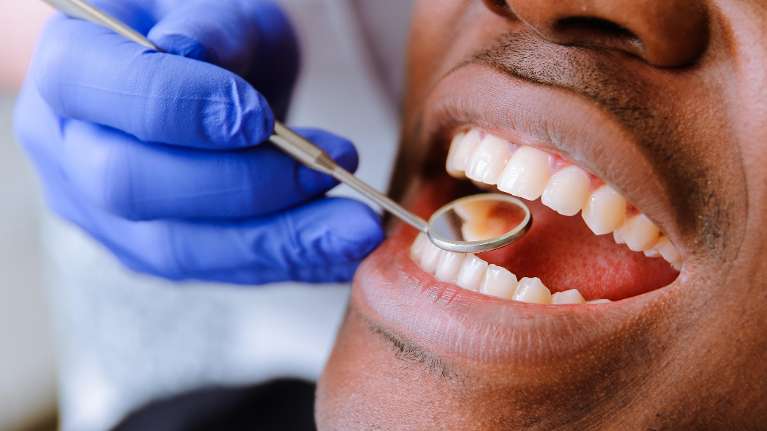
If you have a dental concern and search “emergency dentist near me,” you will probably find Quality Dental Care in Lakeland, FL. Our staff prides itself on providing honest and affordable dentistry to you and your entire family. We realize that each person’s dental needs differ, so we offer a wide range of treatment options to help you achieve your best smile.
Our dental team works diligently to keep you informed and educate you about all the dental conditions that may affect you, including oral cancer. Almost twelve of every 100,000 adults will develop oral cancer, with males developing oral cancer at nearly three times the rate of females. Because of this, oral cancer awareness and prevention is a topic we take seriously, and we want to help our patients understand the risk factors and treatment options.
What Is Oral Cancer?
Oral cancer is part of a larger category known as head and neck cancer and includes cancer found in any part that makes up the oral cavity. Oral cancer can be on any of the following parts of the oral cavity:
- Tongue
- Under the tongue
- Lips
- Gums
- Inside the cheek
- The roof of the mouth
What Early Detection Methods Are Available?
It is essential that your dentist performs an exam of your entire mouth to find oral cancers early. At Quality Dental Care, we always do an oral cancer screening when you visit our dental office for regular dental checkups.
We also recommend you look in your mouth regularly to see if you have any sores, lumps, or white patches. If you smoke or use tobacco, or drink alcohol, it is especially important to check your mouth because you are at a greater risk for oral cancers.
If you are at a high risk for oral cancers, some special lights or dyes can be used to scan for abnormalities that could be cancerous and may require a biopsy. Your doctor or dentist will recommend these tests if they think it’s necessary.
What Are the Risk Factors for Oral Cancer?
A risk factor is defined as anything that makes you more likely to develop oral cancer. It is important to note that risk factors don’t typically cause cancer, but they do make you more susceptible to getting cancer.
You are at the most significant risk of developing oral cancer if you:
- Use tobacco, such as cigarettes, pipes, cigars, chewing tobacco, or snuff. In fact, eighty-five percent of oral cancers can be attributed to using tobacco.
- Consume alcohol regularly; if you drink alcohol and use tobacco, your risk increases even more.
Other risk factors for oral cancer include the following:
- Too much exposure to the sun – It’s essential to use sunscreen if you are out in the sun.
- HPV or Human Papillomavirus – If you have the HPV virus, you are more likely to get oral cancer.
- Gender – Men are more susceptible to oral cancer than women.
- Skin tone – Fair-skinned people are more susceptible as well.
- Oral hygiene – If you don’t get regular dental cleanings or take good care of your teeth, you are at a higher risk for oral cancer.
- Age – If you are over 45, your oral cancer risk increases.
- Diet – If you don’t consume enough fruits and vegetables, you are at an increased risk for oral cancer.
- Immune system – People with a compromised immune system are also at a greater risk.
What Oral Cancer Treatment Options Are Available?
If you have oral cancer, you have a variety of treatment options available. Some of your options include the following:
Surgery – Depending on the type of oral cancer you have and how far it has progressed, many different surgical options may be available.
Radiation therapy – Sometimes used before or after surgery, radiation therapy is a treatment option for oral cancer. Different types of radiation therapy include external-beam radiation, internal radiation, and proton therapy.
Chemotherapy – This treatment option can be used before surgery or radiation in an attempt to reduce cancer, or it can be used in conjunction with radiation to increase its effectiveness.
Targeted therapy – This treatment option works to eliminate the molecules that cancer cells need to survive.
Immunotherapy – In order to survive, cancer cells have to steer clear of the immune system, so this treatment helps make the immune system aware of the cancer cells.
Reconstruction and rehabilitation – If oral cancer treatment causes difficulty swallowing or speaking, physical therapy or surgical intervention may be necessary to restore speech and eating capabilities.
Do You Need a Dentist in Lakeland, FL?
If you believe you may have symptoms of oral cancer, or if you want to talk to a member of our dental team, we are ready to take your call. Please get in touch with Quality Dental Care at (863) 858-3891 for more information or to schedule an appointment. Our top priority is oral health, and we look forward to caring for you and your family.
